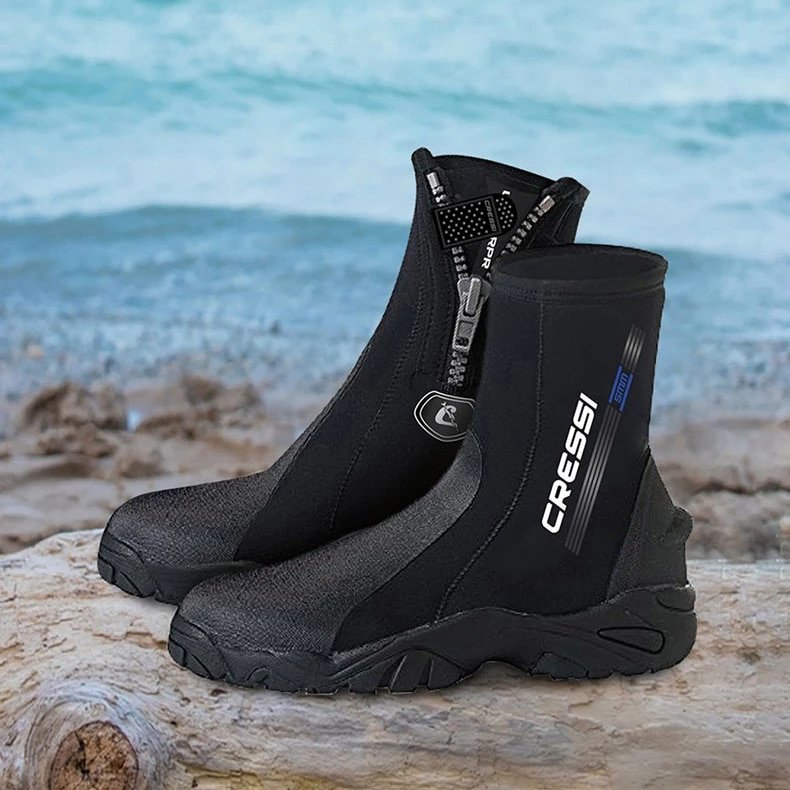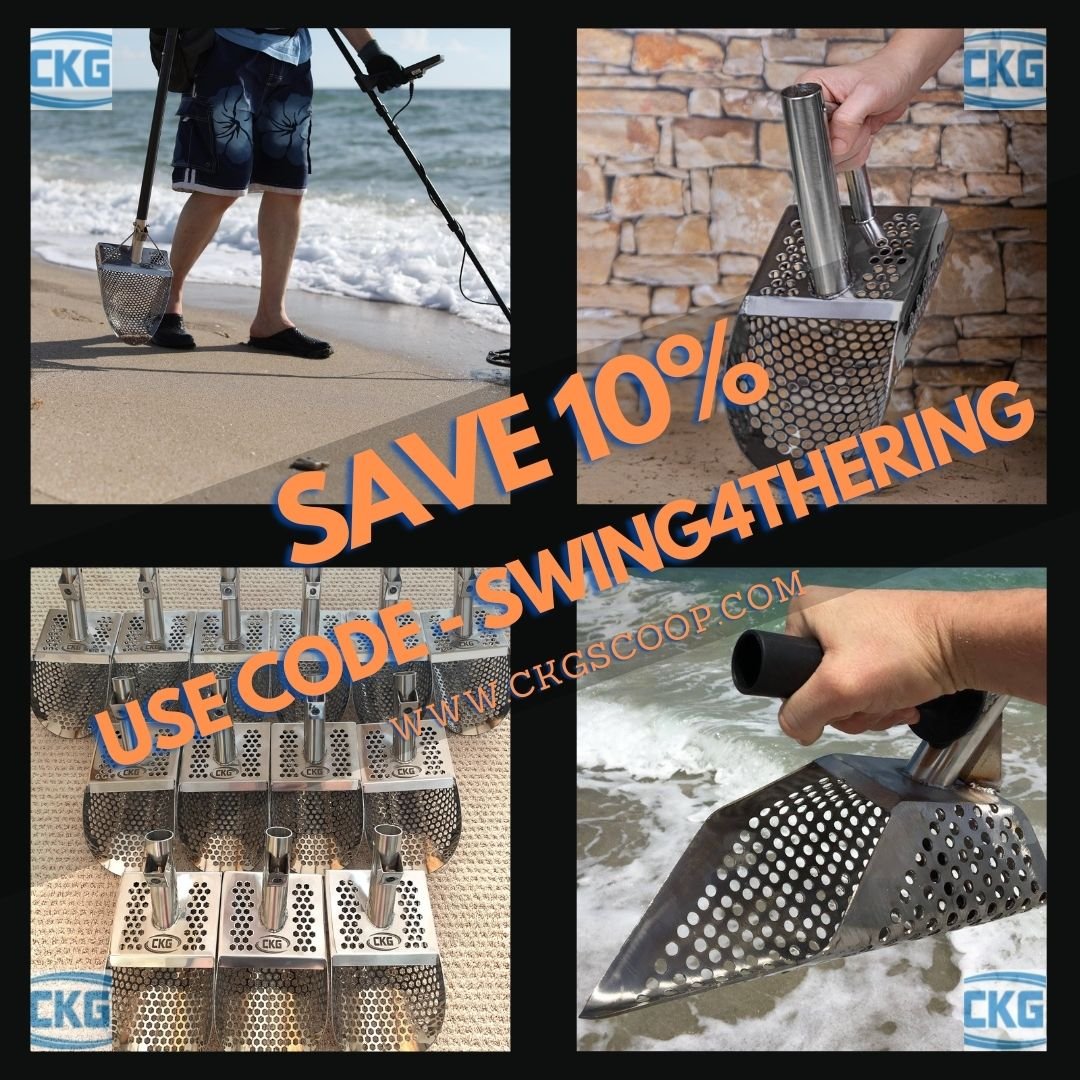Can You Use A Metal Detector In The Water?
YES - you can bring your metal detector in the water to search for lost treasures! With all of the advanced technology in today’s world, using a metal detector in the water is certainly possible. But first…
Let's make sure it is safe to do so and then talk about some of the reasons on why you might want to use your metal detector in the water to begin with. It is also important to identifying if your metal detector is completely or only partially submersible.
**DISCLAIMER - As an Amazon Associate I earn from qualifying purchases. The links in the article are affiliate links that help support this blog and my channels. Metal Detecting Life is supported by you, the readers! When you purchase something I recommend via my links, I may get an affiliate commission (terms of service) — but it never affects the price you pay. Cheers!
Types Of Waterproof Metal Detectors
While the metal detectors listed below are not a fully comprehensible list, they are several waterproof metal detectors that are trusted throughout the hobby and are battle tested in the surf, many of which I have personally owned or used.
Garrett AT Pro
Waterproof and submersible up to a depth of 10ft/3m. Great all-around detector and for freshwater metal detecting.
Nokta Makro Simplex+
Waterproof and submersible up to a depth of 10ft/3m. Features both audio & vibrational targeting signaling modes. Built in “beach” search mode.
Minelab Equinox 900
A new Equinox 900 from Minelab to help you find more treasure than ever before. With a new and improved Beach mode, you will be sure to find something and maybe even some gold with the Equinox.
Minelab Excalibur II
Waterproof and submersible up to a depth of 200ft/60m. Known as the world’s BEST underwater detector. Works well regardless of detecting the beach or diving shipwrecks.
XP Deus II
Get ready to go underwater up to 66ft with all the power of a multi-frequency metal detector with the XP Deus II
Nokta Makro PulseDive
Waterproof and submersible up to a depth of 200ft/60m. Small form factor and handheld makes for the perfect diving companion. Comes with dive flashlight!
Garrett AT Pinpointer
Waterproof and submersible up to a depth of 20ft/6m. Great accessory for shallow water pinpointing, especially if using “fanning” method to retrieve targets.
Is It Safe To Use A Metal Detector In The Water?
When it comes to using your metal detector in the water, the most common question will be, “Is it safe?” To that I answer, “Yes! Relatively…”
I say “relatively” because there are a few precautions to take to insure both your and your metal detector’s safety while metal detecting in the water.
Check Manufacturer Specifications
It is very important to double check that the metal detector you own is rated “waterproof” according to the manufacturer specifications. Metal detecting manufacturers will often denote on the box or in the user’s manual whether their specific model is “waterproof,” “water-resistant,” or neither.
If a metal detector is listed as being “waterproof,” that will mean that the metal detector is fully submersible up to a particular depth, which will also generally be indicated on the original box or found in the user manual.
A metal detector that is advertised as being “water-resistant” does not have the necessary means to be full submerged, but would be suitable to use in the rain if someone so desired. It would also be acceptable to use in the shallow waters as the majority of coils are waterproof just as long as you did not submerse the area where the main control box is housed.
If you can not find a manufacture’s rating on whether your metal detector is waterproof or water-resistant, it would be safe to assume neither and best to stick to dry land rather than risk damaging your investment.
Battery Compartment & O-Rings
One of the easiest ways to ruin your metal detector when using it in the water is to have it leak in to the battery compartment. Below is a short video of a problem I had with my Minelab Excalibur II that arose from water leaking in to the battery compartment.
Many metal detecting manufactures have put safety precautions in place to help alleviate leaks from happening, but preventing a leak is never a guarantee.
One such precaution is checking to see if your metal detector’s battery compartment has an O-ring - a rubber gasket that creates a seal when seated in place or compressed so that no fluid or gas is allowed to pass through the chamber.
Make routine inspections of your metal detector’s O-ring(s) so that you know they are seated in place properly and have not cracked or ruptured; replacing any O-ring that has as they are often a very cheap and affordable fix.
Taking that extra time and care to be sure your batteries are completely sealed prior to each metal detecting excursion and won’t allow for water to leak in will help give you peace of mind while you are enjoying your search for lost treasure.
Headphones
Often times a metal detector will be rated as “waterproof” but the manufacturer will sell it with headphones that are not. They do this because in order to get waterproof headphones, it is a separate accessory and an upsell for them.
If you are metal detecting in the water, make sure you pair your machine with the appropriate waterproof headphones.
Bummer I know… but it should be pointed out that this is just one more item to check the specifications on so that you don’t risk damaging your headphones or your metal detector for that matter because the stock headphones they include may not protect water from getting in to the headphone jack.
*Take the time to read your user manual and know your equipment’s specifications!
Environmental Safety Hazards
Aside from equipment specifications that can effect the ability of you metal detecting in the water safely are the natural environmental hazards. Below I have listed some of the things you should look out for or be aware of:
Waves, Tides & Rip Currents
Water is a powerful force of nature and should not be underestimated when metal detecting. There’s a reason so many treasures remain in Davy Jones’ Locker…
Before venturing in to the water to go metal detecting, consider the waves, tides, and check any local beach forecasts to see if there is a possibility of rip currents. Getting knocked off your feet while wading through the water can spell disaster, especially if you are weighed down with additional equipment like a scoop and metal detector around your arm.
Foul Weather
Have a good idea of the weather forecast before stepping in to the water to metal detect. Being in the water with a metal detector and scoop in hand during a lightening storm makes you a walking lightening rod!
If foul weather begins to move in to the area, pack up and take a break with some fish tacos at the local tiki bar!
Swimmer’s Itch
Metal detecting in the water can increase the chances of getting “swimmer’s itch,” an allergic reaction caused by parasites that can yield small blisters, itching, tingling, or burning of the skin and often leaves a rash.
Photo Credit: Jakob Owens
Swimmer’s itch can usually be avoided by checking for announcements or notices at local beaches or with park & health departments who monitor levels of lake and water bacteria. It is also good practice to immediately shower or rinse off after swimming in any body of water.
Dangerous Sea Life/Shells/Coral
To go along with the dangerous natural elements of metal detecting in the water are considering those who call the water home.
Having an encounter with a stingray, jellyfish, snake, snapping turtle, or the infamous shark is not out of the realm of possibilities when you take your love of treasure hunting into the water. Even walking among the shells and coral can pose a risk to one’s safety if not careful as they can be sharp.
One accessory that I always use when metal detecting in the water is a pair of hard-bottomed dive boots. They help protect my feet from any of the sharp or unforgiving objects on the bottomlands as I walk through the water and dig down with my scoop.
The Buddy System
Using the buddy system anytime you are in the water is a great way to minimize your risk and increase the likeliness of your safety.
While many people who metal detect prefer not to do so in a crowd, metal detecting in the water with several people around you or at least along the beach and within earshot can hear you if something happens to go wrong.
If you’re not able to have a friend or family member join you in the water while you are metal detecting, at least make sure to tell someone where you are going and how long you expect to be out in the water. That way if you don’t return or contact them within a reasonable timeframe, they can alert someone to go look for you.
Trying to convince my wife to be my buddy as I get ready to metal detect the water… Photo Credit: Kayla Swem
For my buddy system, I personally like to try and convince my wife to come out and enjoy a day at the beach with me while I metal detect. It is the perfect trade off as she gets to relax and lay while I get to look for treasure and play!
Why Would You Use A Metal Detector In The Water?
There are several reasons as to why you would want to use a metal detector in the water:
PEOPLE SWIMMING LOSE THINGS!
The water tends to have an effect on helping people lose their valuables (who knows why they swim with them!). This could be due to the waves crashing in to them and knocking them over, causing things to fall out of pockets.
The change from air to water temperature can cause fingers to shrink and rings that once fit snuggly tend to slip off, especially with the addition of slippery sun lotion on their hands.
I found her lost engagement ring that was lost on this sandbar for over 2 years! Photo Credit: Ace Covey
And of course people enjoy playing and splashing around in the water, which could lead to all sorts of possibilities as to how things become lost during their excitement.
ITEMS DROPPED IN THE WATER ARE DIFFICULT TO SEE & FIND
As soon as an item gets dropped in to the water, it becomes very difficult to find again. This is due to the visibility differences in the water as things like bubbles, waves, moving sand and sediment, and refraction of light all cause difficulty in seeing down through the water.
Also, not to mention that most objects will quickly become buried and sink under the sand and out of sight as soon as they hit the bottom.
PEOPLE HAVE ALWAYS BEEN DRAWN TO WATER
From the dawn of time, people have been drawn to areas of water because it is a life source. Because activity and life have always taken place around bodies of water, the likelihood of finding something worthwhile is very great in and around the shores.
How Do I Retrieve My Target Underwater
Use A Beach Scoop
Because it can be difficult to see a target underwater and odds are that it is buried by the sand or silt below, you’ll need to know how to retrieve your treasure from beneath the water. One way of doing this is to have a metal detecting beach scoop.
Using a beach scoop can make quick and light work when it comes to retrieving a target underwater. These scoops act as an excavator by pushing it down in to the sand with your foot where you’ve located a target with your metal detector and then lifting it up through the water with the handle.
The scoop will have small holes that act as a screen to allow the sand and tiny rocks or shells to fall out while still keeping your target inside the scoop.
With a little practice, you’ll be able to dig and sift your targets with ease and speed while metal detecting in the water.
Click here to see the full line up of CKG brand metal detecting beach scoops and save 10% with code: SWING4THERING
Fanning
Fanning is a method used when diving or snorkeling in which you typically use your hand and wave it back and forth or up and down to blow the sand and sediment out of the area to recover a target as seen in the video below.
It is also possible to use your diving fins on your feet to fan with, although it will be harder to see the target as you’ll be further away unless you’re extremely flexible!
Because your target will often be much heavier and more dense than the sand or silt around it, the target will not be blown away as you continue to fan. Keeping your eyes open on the area should eventually reveal the hidden treasure as enough sediment becomes fanned away.
You may notice that you may need to fan in short intervals to allow the water current to carry away and sediment clouds that are created until you can regain visibility depending on the conditions.
Summary
Now that we’ve learned that it is possible to use a metal detector in the water and why it may be advantageous of us to do so, what local swim areas or bodies of water can you think of that may hold treasure waiting to be found?
READ THIS ARTICLE
If you’re not a fan of getting in the water but still want to search the depths of Davy’s Locker, perhaps you should read my article on “Magnet Fishing” to see what it entails and what treasures the hobby can yield!
But… no matter what you decide, I hope treasure fills your chest soon!


























